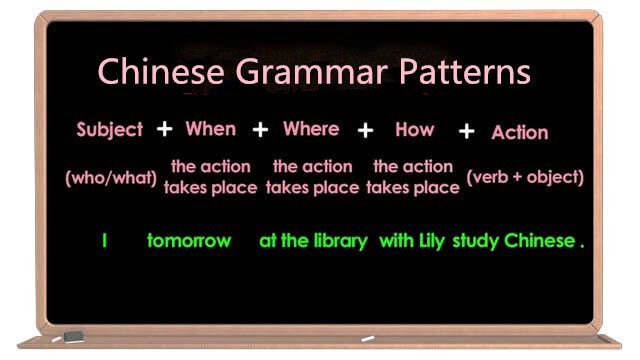Four Must-Know Chinese Grammar Patterns for Beginners
Posted by Fifi Yang 11055

Compared to pronunciation and character writing, Chinese grammar might be the easiest part for beginners. For example, the verbs are not conjugated, and there are no masculine and feminine words (as in Latin-based languages, for example), and no plurals. On top of that, Chinese has only three tenses---past, present and future. Yet, people usually just use present tense, so you don’t need to worry about that. Further, there’s rarely any need to distinguish between the polite and familiar forms of saying things (as in some languages, where, for example, there is a polite form for “you” when addressing someone older or with more status). So, to save you a lot of time, I will share the grammar patterns you must know.
1. Subject + Verb+ Object
This is the most basic Chinese language pattern, which also follows the same sentence order as in English. So, for example:
I = Wǒ 我
Go = qù 去
Shenzhen = Shēnzhèn深圳
Add it all together to make “Wǒ qù Shēnzhèn” 我去深圳– I go to Shenzhen.
2. Negative form: bù 不 / 没 + Verb
To make a sentence negative, you just add no/not, in front of the verb. Remember, bù 不 is to negate the verb in the present and future tenses. Use méi没 for verbs in the past tense.
e.g. Wǒ bú qù Shēnzhèn 我不去深圳– I don’t go to Shenzhen
Wǒ méi qù Shēnzhèn 我没去深圳 - I didn’t go to Shenzhen.
3. Yes/no question: statement + ma?
To make the statement into a yes or no question, you just add “ma吗?” at the end.
e.g. Wǒ qù Shēnzhèn ma? 我去深圳吗– Do I go to Shenzhen?
Of course we can change “wǒ” to “nǐ,” which means “you.”[In American English we use the “double quotation marks and only use the ‘single quotation marks when we are citing a quote’ within a quote.” It is important to stay consistent with style and not mix British and American style, because the reader will be confused. Since I am American, I edit based on American style. Also, periods and commas “go inside the quote, like this.”
4. No-verb sentence: Subject + Hěn + Adjective
This rule seems a little complicated, but it’s actually quite straightforward. It simply means that there is no verb in the sentence, and the adjective actually functions as a verb. However, many beginners find it difficult to adapt to. Let’s look at some simple examples:
Nǐ hěn piāoliang!你很漂亮!You are beautiful!
If you translate the sentence into Chinese, there is no verb in the sentence, which is “Nǐ hěn piāoliang!” instead of “Nǐ shì hěn piāoliang!”
In addition, the adjective used as the predicate in an affirmative sentence needs a preceding adverb, e.g. “hěn.” In this case “hěn” should not be stressed and doesn’t really mean “very.”
Now, that wasn’t so difficult, was it? If you want to learn more Chinese grammar, please do not hesitate to book a free trial class and let our teachers help you!










